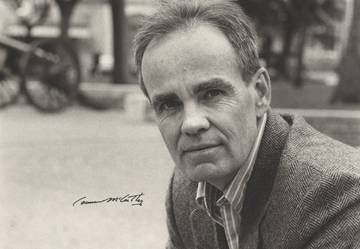

Cormac McCarthy, by Bill Wittliff, © 1987

Released September 10, 2014
SAN MARCOS, TX - Acclaimed as one of America’s greatest writers, Cormac McCarthy has crafted some of the finest novels of our time, including All the Pretty Horses, No Country for Old Men, Blood Meridian, and The Road, for which he was awarded the Pulitzer Prize. Literary curator Steve Davis draws from the Wittliff’s extensive permanent archive of McCarthy’s papers at Texas State to unveil the intricate creative process of this world-renowned author.
The exhibition traces McCarthy’s writing from the sources of his original inspiration to the formation of his vision into novels, screenplays, and films. Also on display are examples of the scope of his historical research and the meticulous attention he pays to revising his prose.
Many chronicled real-life events have fed McCarthy’s novelistic imagination, and this exhibition highlights the author’s rigorous research. A variety of books McCarthy relied upon testify to his dedication to precise detail. His own hand-drawn maps of the locales he wrote about reveal some of the ways he maintained accuracy of place.
Particular attention is given to McCarthy’s reliance on Texas author J. Frank Dobie. McCarthy consulted Dobie’s writing on scalp hunters while working on Blood Meridian. He also utilized Dobie as a major source for The Crossing, the second novel in his Border Trilogy. On exhibit are McCarthy’s carefully annotated passages in Dobie’s writing along with examples of how McCarthy later adapted those sections into his own work.
The lyrical beauty of McCarthy’s prose is one of the hallmarks of his writing. His drafts demonstrate that his exceptional wordplay results not merely from raw talent but also from a rigorous work ethic. McCarthy will often spend years—sometimes decades—fine-tuning a manuscript before he’s ready to see it published. Numerous examples of careful editing across multiple revisions are evidence of a writer as equally intent on using just the right word as he is on crafting a powerful, evocative phrase, paragraph, or scene.
Perhaps because of their visual acuity, expressive dialogue, and cinematic plots, many of McCarthy’s novels have been adapted into major motion pictures. The Wittliff exhibition also shows McCarthy’s long-standing interest in the movies. In the 1970s, he wrote a teleplay for a PBS movie, The Gardener’s Son, and appeared briefly in the film as an extra. In recent years, McCarthy has often been spotted on the sets of movies inspired by his work, such as The Road, and, most recently, The Counselor, a Ridley Scott film based on McCarthy’s original screenplay.
One little-known fact McCarthy’s archive discloses is that he has been writing screenplays for a long time. Even though most of them were unsold, many of those early works invigorated his career as a novelist. A screenplay he completed in 1978 inspired his acclaimed Border Trilogy, which began with the National Book Award-winning All the Pretty Horses in 1992.
In the 1980s, McCarthy composed a screenplay titled “No Country for Old Men.” Although he was unable to sell it at the time, he later returned to the piece and began reworking the story into a novel. Twenty years after completing the screenplay, McCarthy published No Country for Old Men. Unique to this exhibition are drafts from his screenplay that allow viewers an interesting opportunity to compare McCarthy’s early original vision to the Academy Award®-winning 2007 film by the Coen brothers.
Other materials lending insight into the life of this private writer include numerous photographs and special pieces from several McCarthy-related collections held at the Wittliff. Among these is McCarthy’s correspondence with Howard Woolmer from the Woolmer Collection, and—now on view for the first time—a sample of Peter Greenleaf’s correspondence with the author, which Greenleaf generously donated to the Wittliff Collections in 2013.
Also unveiling the man as a literary legend is a selection of notable works by scholars from around the world who have studied various aspects of McCarthy’s complex writing in great depth.
- Facebook
- Twitter
- Instagram
- Youtube
Email List